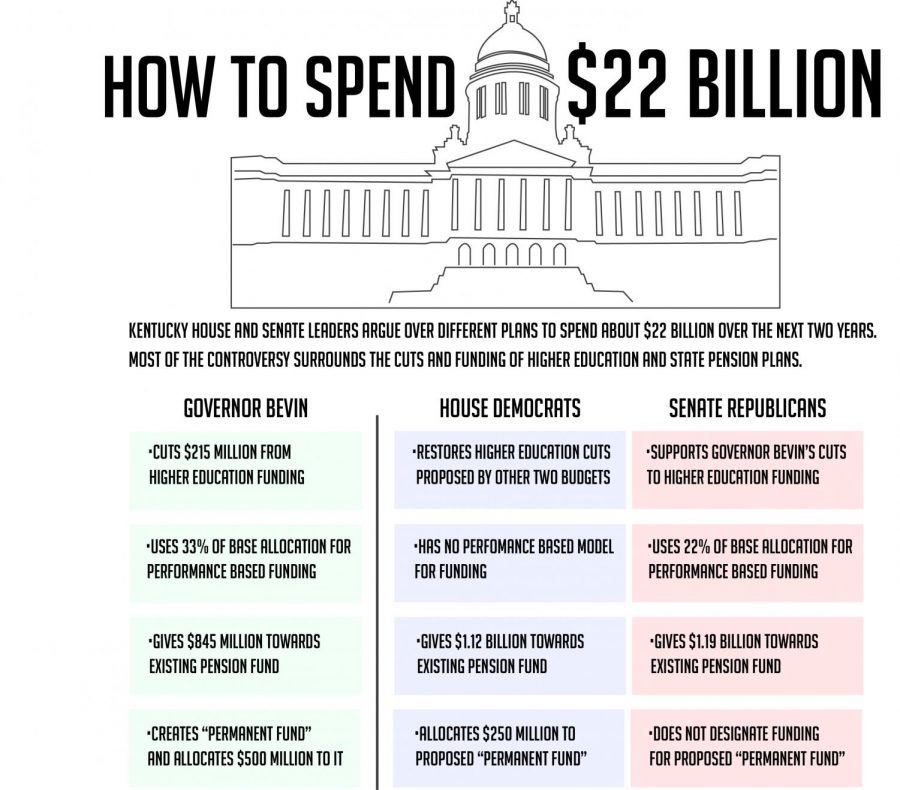House rejects Senate budget proposal
March 29, 2016
On March 23, the Kentucky Senate passed its version of the state’s budget; however, this budget was quickly rejected by the House of Representatives, and a joint Budget Conference Committee was appointed to reach a compromise.
The Republican-run Senate’s budget proposal was similar to Gov. Matt Bevin’s budget, which cut $650 million in state funding from various areas.
Bevin’s budget included an initial 4.5 percent budget cut and then additional 9 percent cuts to nearly all agencies, including postsecondary education. The House had removed all of these cuts in its budget proposal, but the Senate’s budget restored these cuts.
Senator Stephen West said the budget cuts, while difficult, are necessary to stabilize the state’s pension system. If the system is not stabilized, West said, there could be “catastrophic” results.
“It’s not something that we want to do; unfortunately, it’s something that we have to do,” West said during the presentation of the bill.
The cuts to postsecondary education, which total $215 million, have come under fire from university presidents.
West said he believed the universities will be able to continue to supplement their lost funding in other ways.
West said that after the 2007 economic downfall, the state was forced to cut funding for postsecondary education institutions. In response, the universities found other means, such as endowments, to generate funds. Rather than lose revenue, the schools were able to increase it, and the total revenue for all state universities rose from $4.7 billion in the 2007-2008 fiscal year to $6.3 billion today.
WKU’s revenues also increased during this time. During the 2007-2008 fiscal year, WKU brought in $288,788,582 with 29 percent coming from state appropriations. During the 2013-2014 fiscal year, the university’s total revenue was $324,485,791 with only 22.3 percent coming from state appropriations. During this time, tuition increased nearly 11 percent.
The Senate’s budget also restores performance-based funding, which was a part of Bevin’s budget the House removed.
In the Senate’s proposal, performance-based funding will account for 25 percent of the contribution from the state. It also includes a stop-loss component that will prevent universities from losing too much funding if their performance causes them to fall too quickly.
In addition to including performance-based funding, the proposal also restores equity funding to WKU and Northern Kentucky University.
Sen. Christian McDaniel said the Council on Postsecondary Education released a report that showed WKU and NKU were underfunded compared to the other state universities. To be compensated for this loss, WKU and NKU will be given a portion of the equity funding the governor originally promised in his budget proposal. If these funds are given, WKU will receive $2.6 million.
West said restoring the equity funding was necessary.
“This is important because if we’re going to enter an era of performance-based funding, it is important that there be a fair and equitable starting point,” West said.
In an email, President Gary Ransdell said he has spent a large amount of time in Frankfort lobbying against the budget cuts.
“I have continued to have discussions with Gov. Bevin and his key staff as well,” Ransdell said. “All of the university presidents have worked together to advocate for Kentucky’s higher education priorities — primarily, protecting university base funding.”
Ransdell said other portions of the bill, including the portion denying funding to capital projects, will also affect the school.
The university currently has plans to build a new facility for the Gordon Ford College of Business and a new parking structure; however, these plans are currently in jeopardy because of funding cuts.
In addition to higher education institutions, very few government agencies were exempt from budget cuts.
McDaniel said he understands the budget cuts will be difficult, but all of the cuts are necessary given the state’s current financial situation.
“We have to address our current problems in order to be able to invest in our future opportunities,” McDaniel said.
Members of the Budget Conference Committee must reach a compromise by Monday at midnight. If they fail to reach this deadline, they could lose out on the opportunity to dispute vetoes from the governor.

























